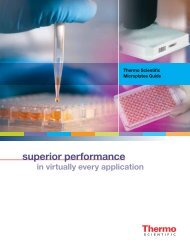PeloBiotech
You also want an ePaper? Increase the reach of your titles
YUMPU automatically turns print PDFs into web optimized ePapers that Google loves.
www.pelobiotech.com<br />
1. Tissue Engineering Research: Benchtop fluid bioreactors are employed in tissue engineering studies to simulate<br />
physiological conditions for the cultivation of cells and tissues. These systems allow researchers to investigate cell<br />
behavior, tissue development, and the impact of different factors on tissue growth and functionality.<br />
2. Regenerative Medicine: Fluid bioreactors are crucial for the development of regenerative medicine therapies. They<br />
provide controlled environments to support the growth and maturation of bio-engineered tissues, facilitating the<br />
creation of functional substitutes for damaged or diseased tissues.<br />
3. Drug Testing and Screening: These bioreactors are utilized for drug testing and screening purposes. The 3D cell<br />
cultures in fluid bioreactors more accurately mimic in vivo conditions compared to traditional 2D cell cultures,<br />
allowing for better predictions of drug responses and toxicity.<br />
4. Vascularization Studies: To create functional and viable tissues, vascularization is a critical factor. Fluid bioreactors<br />
enable researchers to study and optimize the vascularization process within bio-engineered tissues, improving the<br />
overall success of tissue transplantation.<br />
5. Stem Cell Expansion: Benchtop fluid bioreactors are used for the expansion of stem cells, providing a controlled<br />
environment to support the proliferation and differentiation of stem cells into specific cell lineages required for<br />
tissue engineering applications.<br />
6. Bioprocess Development: These bioreactors play a role in developing and optimizing bioprocesses for large-scale<br />
production of bio-engineered tissues. Understanding the requirements for scale-up and maintaining a consistent<br />
and controlled environment is crucial for successful tissue production.<br />
7. Muscle and Skeletal Tissue Engineering: Researchers use fluid bioreactors to create bio-engineered muscle and<br />
skeletal tissues. The controlled fluid flow and nutrient supply in these systems contribute to the development of<br />
tissues with improved structural and functional properties.<br />
8. Cartilage Regeneration: Benchtop fluid bioreactors are employed in the development of bio-engineered cartilage<br />
tissues. The controlled mechanical forces and nutrient supply within the bioreactor contribute to the formation of<br />
cartilage structures with desired properties.<br />
9. Connective Tissue Engineering: The creation of connective tissues, such as tendons and ligaments, involves using<br />
fluid bioreactors to simulate the mechanical forces and biochemical cues needed for tissue maturation and<br />
functionality.<br />
EZSPHERE TM Multi-Well Plates and Dishes (AGC ® )<br />
EZSPHERE multi-well plates and dishes (AGC ® ) are coated with a cell/protein repellent (SP polymer) and made from<br />
polystyrene plastic. Unique features are the micro-wells laser etched to the bottom of the plates or dishes. EZSPHERE is<br />
used to generate high numbers of spheroids. The spheroid size is limited by the dimensions of the wells.<br />
Available are dishes from 35 – 100 mm, 6 and 96 well plates.<br />
47
















